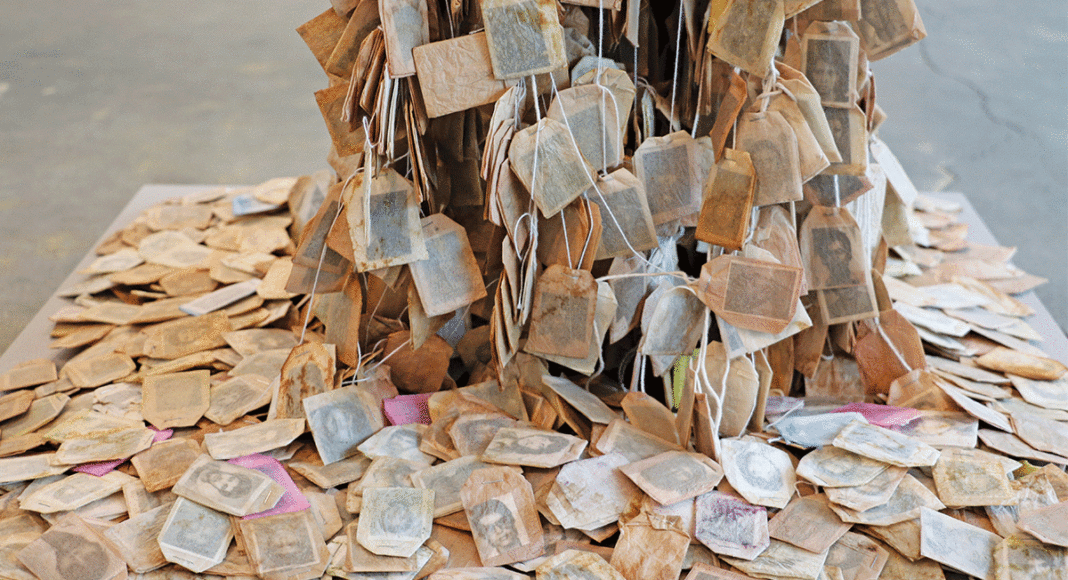Like many of us, artist Victor Cartagena has a favorite internet meme.
It’s a two-picture panel; in the top photo, a white family sits at the dinner table, their eyes closed in prayer. The caption reads, “Thanks, Jesus, for this food.” In the bottom photo, a Latino man in a hoodie is standing in a strawberry field, holding a flat of berries. His caption? “De nada.”
Cartagena’s new exhibit at the Museum of Art and History in Santa Cruz, titled “We Feed You,” takes on the same theme in a more expansive—if less Reddit-friendly—way. The new show attempts to address some of the uncomfortable truths about our agricultural industry in often provocative, even satirical ways.
For example, in the center of the MAH’s third-floor gallery is a handsomely appointed dinner table that the San Francisco-based artist has titled “La Santa Cena (The Last Supper).” On the table, glowing yellow in condiment bottles, are samples of sulphur, which is so ubiquitous as a pesticide in the fields that it often ends up in the food (as well as on the clothes and the bodies) of the migrant workers at the end of a long day. “The people picking your food can’t even enjoy their own food,” says Cartagena.
“We Feed You” is largely the same show that Cartagena brought to the San Jose Museum of Art in 2017. That show was tailored to the exhibition space in San Jose, and the new show is similarly designed to fit into the MAH. An 80-foot-long mural of charcoal sketches, for example, has been cut and pasted into an entirely different context in Santa Cruz. The sketches feature an unsettling collection of figure studies mixing human and donkey characteristics to form a satire of bureaucracy called, in a Spanish-flavored pun, the “Burrocracia.” More haunting (but no less punny) is an enormous cascade of tea bags, each containing a photo of a migrant worker, titled “Labor Tea.”
“The connection is they use you, they suck all the good out of you, and when there’s no more to get from you, they throw you away,” says Cartagena.
A native of El Salvador, Cartagena came to California as a young man during the Salvadoran civil war in the mid-1980s. His work has never shied away from the political, but he had never addressed the policies of the U.S. food production system until this show.
“I never quite understood what the campesinos were going through until this project,” says Cartagena. “It’s one of those things that I never experienced for myself. Even if you hear stories about how life is for the campesinos in the field, you don’t really pay attention to it.”
His muse in the “We Feed You” project was a 102-year-old Salinas man who stood alongside Cesar Chavez in the United Food Workers movement, Maurilio Maravilla. Maravilla not only embodies many of the workers’ rights issues that Cartagena illustrates in the show, he’s also the direct subject for the show’s most visceral component. Inspired by Maravilla’s stories of sucking on sugar cane to maintain energy for a long day’s work, “Sugar Face” features a dozen casts of Maravilla’s face, each made of sugar. The masks are designed to decay and melt over the course of the four-month show.
“They start to disintegrate pretty quickly,” says the artist. “Each one is made a little differently, so one will decay faster than another. And eventually, they’ll all disappear.”
One of the show’s biggest challenges, says Cartagena, was casting a life mask on a 102-year-old man, who had to sit still with his face in plaster for 20 minutes. “I was afraid he was going to fall asleep or something. We recorded the whole thing, and at the end, we asked him what was the most difficult thing about it, and he said, ‘You kept asking me if I was OK. I’ve been through so much in my life. This is nothing.’”
‘We Feed You: Works by Victor Cartagena’ runs through July 22 at the Museum of Art & History, 705 Front St., Santa Cruz. santacruzmah.org.














